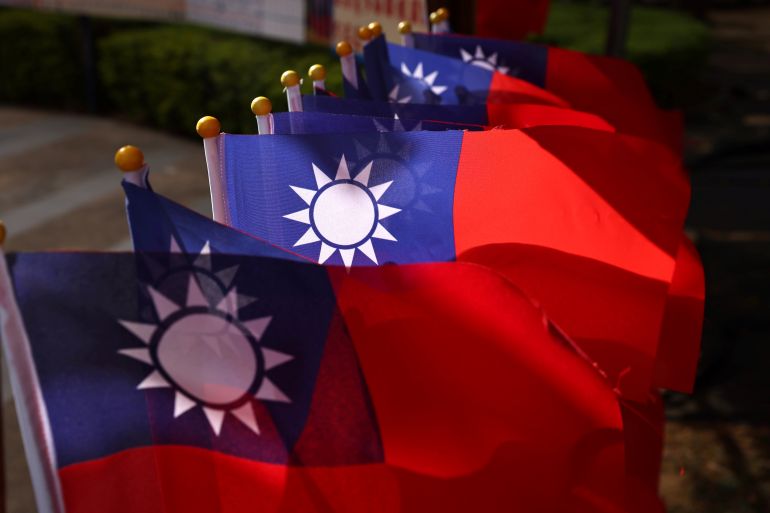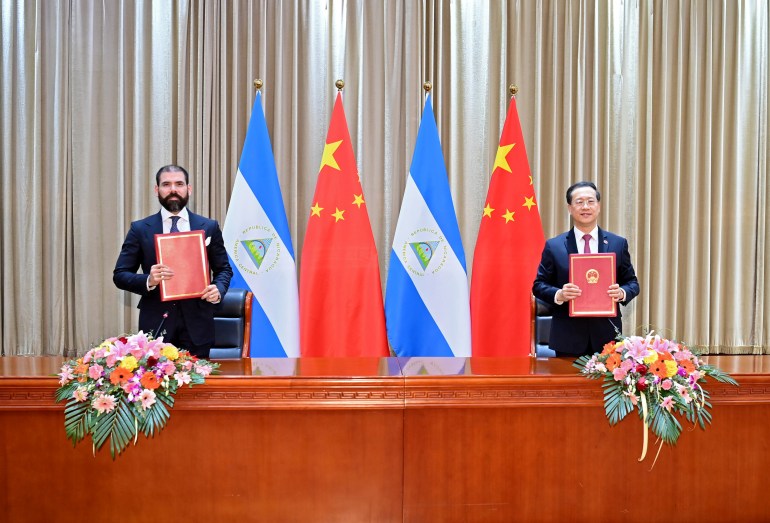Who are Taiwan’s diplomatic allies?
After Nicaragua break, island left with only 14 formal diplomatic allies, mostly small countries in the Pacific, Caribbean, Latin America and Southern Africa.

With the departure of Nicaragua, Taiwan only has 14 formal diplomatic allies left.
These are mostly small countries in the Pacific, Caribbean, Latin America and Southern Africa that receive heavy foreign aid donations and loans. Prior to its break with Taiwan, Nicaragua had received a $100m loan that helped sustain it in the face of United States sanctions.
Keep reading
list of 3 itemsUS legislators meet with Taiwan president in surprise visit
After early success, Taiwan struggles to exit ‘zero COVID’ policy
Taiwan’s last allies include Belize, eSwatini (formerly known as Swaziland), Guatemala, Haiti, the Holy See (the central administration of the Roman Catholic Church), Honduras, the Marshall Islands, Nauru, Palau, Paraguay, Saint Kitts and Nevis, Saint Lucia, Saint Vincent and the Grenadines, and Tuvalu.
Officials from a newly elected government in Honduras, which had indicated it would stop conducting relations with Taiwan in favour of Beijing, told the Reuters news agency on Friday they would continue maintain ties with Taiwan for now.

Taiwan is formally known as the Republic of China (ROC), whose government retreated to the island at the end of the Chinese Civil War in 1949. The ROC government succeeded the Qing dynasty in China, which collapsed in 1912. After briefly working with the Chinese Communist Party during World War II against a Japanese invasion, both sides turned on each other.
Taiwan represented China at the United Nations until it was expelled in 1971 in favour of the People’s Republic of China based in Beijing. At the time, the ROC government maintained that it represented China so it did not rejoin under a new name like the “Republic of Taiwan” or the “Republic of Formosa”.
Since the 1990s, the new democratic government has de facto given up its claims to China, but the Communist Party in Beijing continues to view Taiwan as a wayward province under the “One China” policy. If Taiwan were to declare formal independence, it would likely trigger a war with Beijing.
Taiwan had initially been the popular choice at the United Nations due to anti-Communist feelings during the Cold War, but it gradually lost support when it became clear the ROC government would not regain power. Taiwan lost many allies in the 1960s and 1970s during the decolonisation boom, and another major blow came in 1979 when the United States switched recognition to Beijing.
While already diplomatically isolated by the 2000s, China began to aggressively pick off Taiwan’s last remaining diplomatic allies as its global power and influence grew. Since President Tsai Ing-wen took office in 2016, Taiwan’s allies have dwindled from 21 to now only 14. Tsai is despised by the Communist Party as a “separatist” because her party sees Taiwan as a de facto autonomous state.